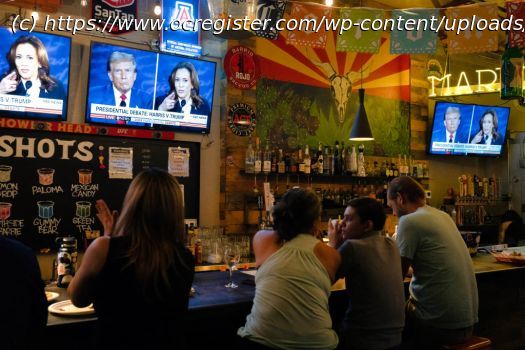Immigration is a far more complex topic than border security alone, and strategists may be miscalculating by failing to consider some key voters and their nuanced perspectives.
Editor’s note: This series explores the priorities of voters in Arizona, Georgia, Michigan, Nevada, North Carolina, Pennsylvania and Wisconsin as they consider the upcoming presidential election. With the outcome expected to be close, these “swing states” may decide the future of the country.
As former President Donald Trump worked to scuttle a bipartisan border deal in Congress because it threatened to derail his campaign’s focus on immigration, Republicans in Arizona unveiled a plan to empower local officials to jail and deport migrants, decrying the federal government’s lack of solutions.
“Arizona is in a crisis,” state Senate President Warren Petersen said in late January. “This is directly due to the negligent inaction of the Biden administration.”
What followed were months of GOP lawmakers in Arizona making use of Trump’s border security rhetoric, employing xenophobic language to cast immigrants and asylum-seekers as criminals. But there was strident opposition to the plan, too, from many Latino and immigrant Arizonans who traveled to the state Capitol to protest the legislation.
Trump and Vice President Kamala Harris offer starkly different plans for the future of the 11 million people who live in the United States without legal status. Harris, in a bid to stave off accusations that she’s soft on the border, has sought to establish a firm security stance. To that end, she has vowed to bring back and sign the torpedoed bipartisan border deal.
On the campaign trail, Trump has taken a far more hawkish approach, promising mass deportations. He has offered few details, other than that he would be willing to involve the U.S. National Guard. President Joe Biden, Trump and other recent presidents have deployed the National Guard or military troops to support Border Patrol actions, but not in direct law enforcement roles.
Immigration has consistently ranked high among voter concerns nationwide, following heightened political rhetoric and a record-breaking number of unlawful border crossings in late 2023. Those numbers have since plummeted to a three-year low, but the U.S. border with Mexico remains a key talking point for Republican politicians.
But immigration is a far more complex topic than border security alone, and strategists may be miscalculating by failing to consider some key voters and their nuanced perspectives, recent polling shows.
Growing populations of new and first-generation citizens in the swing states — with the power to sway elections — are transforming demographics and voter concerns.
In Arizona, Democratic Gov. Katie Hobbs vetoed the legislation that would have allowed local law enforcement to usurp federal authority on immigration, but Republicans repackaged it as a ballot initiative called the “Secure the Border Act.” In a state that Biden won by fewer than 11,000 votes four years ago, and where political strategists anticipate high voter turnout, the ballot measure serves as a test of whether the GOP’s immigration position will drive people to the polls in a swing state.
While many Republicans hope the immigration issue boosts their chances in down-ballot races, progressive organizations are working to mobilize voters in opposition through canvassing and voter registration drives.
Living United for Change in Arizona was established in the aftermath of the state’s controversial “show me your papers” law — SB 1070 — passed 14 years ago by Republican lawmakers. LUCHA Chief of Staff Abril Gallardo derided this year’s Secure the Border Act as the latest iteration of that law.
“Arizonans are sick of Republicans trying to bring back the SB 1070 era of separating families, mass deportations and children in detention centers,” she said. “We’re here to say, ‘Not on our watch.’”
Read more: GOP, Trump build on immigration fears to push voting restrictions in states
The ballot measure has been widely criticized as greenlighting discrimination. Among other provisions, it would make it a state crime for migrants to cross the southern border anywhere except a legal port of entry and punish first-time offenders with six months in jail. Local police officers would be authorized to carry out arrests based on suspicion of illegal entry, and Arizona judges would be empowered to issue orders of deportation, undermining court rulings that have concluded that enforcing immigration law is the sole purview of the federal government.
Gallardo said that LUCHA is focused on engaging with voters to ensure the proposal fails. The organization is part of a coalition of advocacy groups committed to knocking on more than 3 million doors before November.
“They can try to ignore us, but come Election Day and beyond, they will hear us, they will see us, and they will feel the strength of our movement,” she said.
An August UnidosUS and BSP Research survey asked Latino voters in Arizona about their top priorities on several issues related to immigration policy. The results show strong support for protecting longtime residents from deportation and offering them a path to citizenship — along with cracking down on human smugglers and drug traffickers. Policies centered on building a wall or mass deportation ranked near the bottom. In recent years, Latino voters in the state have helped reject virulently anti-immigrant candidates.
In 2020, Latinos made up about 20% of the state’s electorate, and they largely favored Biden over Trump. Then, two years later, a record-breaking number of Latinos voted in an election that saw Democrats win statewide offices. Today, 1 in 4 Arizona voters is Latino, and a new poll from Univision estimates that more than 600,000 will cast their ballots in the state’s November election.
The Grand Canyon State is far from the only swing state with both impactful Latino and new-citizen voting blocs.
Still, campaigns might be ignoring these voters.
Home
United States
USA — Science Changing demographics and the political calculus of anti-immigrant rhetoric in swing states






